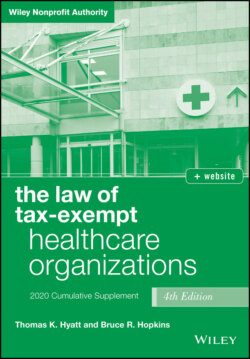Читать книгу The Law of Tax-Exempt Healthcare Organizations - Bruce R. Hopkins - Страница 17
На сайте Литреса книга снята с продажи.
(h) “Religious Liberty” Executive Order
ОглавлениеThe White House, on May 4, 2017, issued an executive order containing guidance for the executive branch of the federal government “in formulating and implementing policies with implications for the religious liberty of persons and organizations in America,” and “to further compliance with the Constitution and with applicable statutes and Presidential Directives.”186.2
The overarching policy of the executive branch is said in this order to be “to vigorously enforce Federal law's robust protections for religious freedom.” Thus, the order states, “[a]ll executive departments and agencies (agencies) shall, to the greatest extent practicable and to the extent permitted by law, respect and protect the freedom of persons and organizations to engage in religious and political speech.”
From the standpoint of the law of tax‐exempt organizations, here is the operative sentence: “In particular, the Secretary of the Treasury shall ensure, to the extent permitted by law, that the Department of the Treasury does not take any adverse action against any individual, house of worship, or other religious organization on the basis that such individual or organization speaks or has spoken about moral or political issues from a religious perspective, where speech of similar character has, consistent with law, not ordinarily been treated as participation or intervention in a political campaign on behalf of (or in opposition to) a candidate for public office by the Department of the Treasury.”
For these purposes, the term adverse action means the “imposition of any tax or tax penalty; the delay or denial of [recognition of] tax‐exempt status; the disallowance of tax deductions for contribution made to entities exempted from taxation under section 501(c)(3) of title 26, United States Code; or any other action that makes unavailable or denies any tax deduction, exemption, credit, or benefit.”
The order states that it shall be implemented “consistent with applicable law.” It concludes with the observation that it “is not intended to, and does not, create any right or benefit, substantive or procedural, enforceable at law or in equity by any party against the United States, its departments, agencies, or entities, its officers, employees, or agents, or any other person.”186.3
